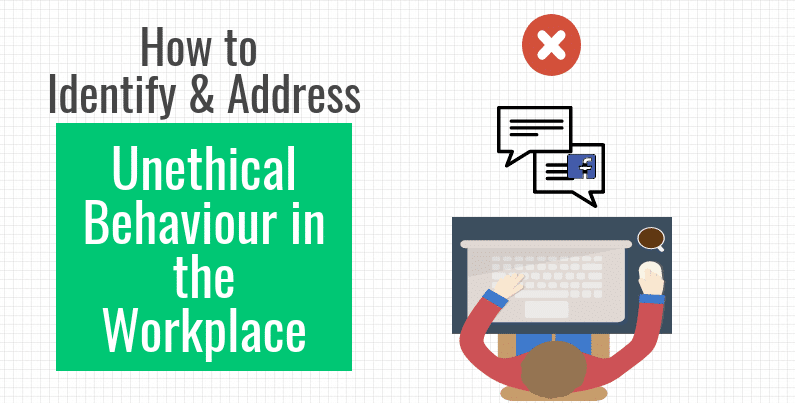
How to Identify and Address Unethical Behaviour in the Workplace
Unethical behaviour in the workplace can be a costly and complex challenge for a business to deal with. Research from the Journal of Business Ethics found that while ethics at a corporate level are improving, there are still significant challenges to addressing issues at the individual level. Poor practices by workers can impact on morale, reputation, and productivity. It can also be a significant cost to the business bottom line.
Businesses need to first identify the source of bad, unethical behaviour and work alongside employees to rectify them.
Common unethical behaviours in the workplace
One of the most commonly reported ‘bad behaviours’ in the workplace is the misuse of company time. This can be staff showing up late, taking longer or additional breaks, falsifying time sheets, or running personal errands on work time. These bad habits can quickly spread to other employees. It can also foster resentment amongst colleagues, severely affecting morale and productivity.
Inappropriate computer use is another common unethical behaviour in many businesses. Forbes found that two-thirds of workers visit non-work-related websites every day. Nearly a quarter of workers admitted to wasting more than five hours per week doing personal business online. This can include online shopping, social media, and checking the news. The main reasons for slacking off include not feeling challenged enough at work, being over-worked, dissatisfaction with the job and boredom. This can cost a business thousands in lost time, impact on overall satisfaction among the workforce, and risks security and liability issues for private commercial information.
The Institute of Leadership and Management in the UK surveyed more than 1600 managers about other unethical behaviours displayed by employees. The most frequently cited included:
- Employees cutting corners (reported by 72 per cent of employers)
- Lying to cover one’s own mistakes (72 per cent)
- Gossiping or badmouthing colleagues (68 per cent)
- Passing the buck when a deadline is missed (67 per cent)
- Stealing low value items from work, such as stationery (52 per cent)
What can a business do to fix and prevent unethical behaviours?
Specific to the use of workplace computers, the Fair Work Commission decided that a company has the right to place rules and constraints on the use of its assets. Businesses have the right to enact and enforce IT usage policies, including monitoring emails from work accounts. However, it is important for any business monitoring email communications and computer usage to provide consistent and regular guidance to staff. Employees should have absolute certainty about their rights and obligations.
For other problem behaviours, it is critical that a business has clear and transparent policies about the use of company resources and expectations of employees during work hours. These policies should be open to feedback from employees. Further, policies should exist for a clear reason – employees are more likely to follow directions where they feel they are contributing to a particular outcome or goal.
Don’t separate the ethics and values of the business from day-to-day activities. They should be built into the workflow of tasks and be part of the overall culture, rather than just existing on paper. If the workforce can see tangible results being achieved, a cooperative team culture will develop. It is also very important that the business and managers reflect the changes they want to see in employees. Employees at all levels of the business are responsible for cultivating an ethical work culture. Be the change you want to see in the business.